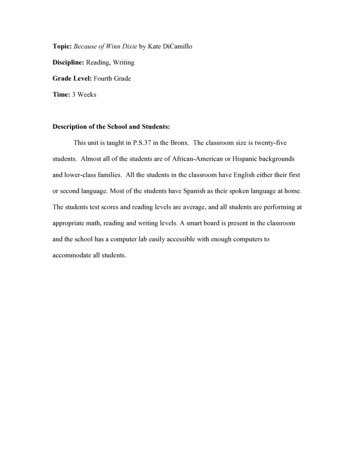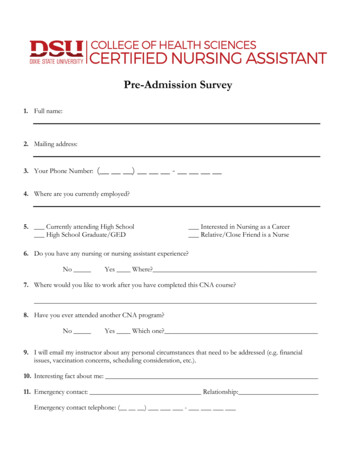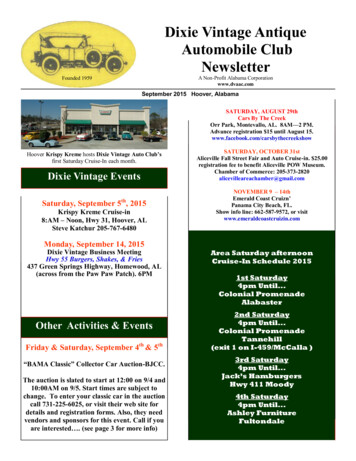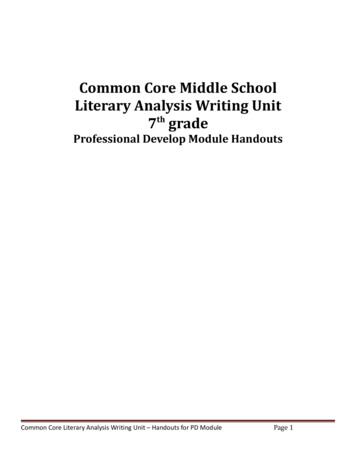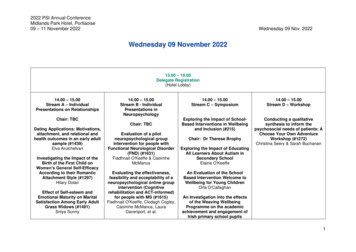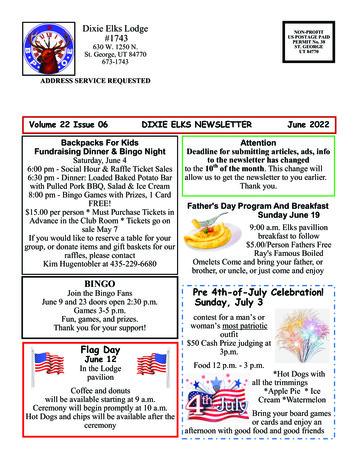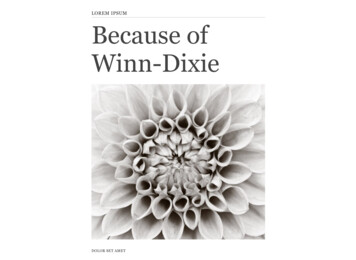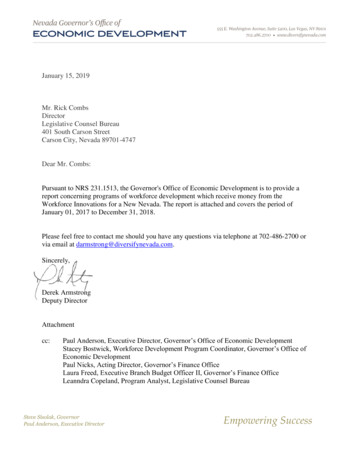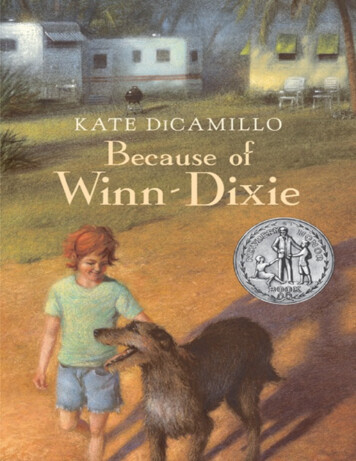
Transcription
Also by Kate DiCamillo:The Magician’s ElephantThe Miraculous Journey of Edward TulaneThe Tale of DespereauxThe Tiger RisingMercy Watson to the RescueMercy Watson Goes for a RideMercy Watson Fights CrimeMercy Watson: Princess in DisguiseMercy Watson Thinks Like a PigMercy Watson:Something Wonky This Way ComesGreat Joy
The author owes a joyful debt to Betty DiCamillo, Linda Nelson, Amy Ehrlich, Jane ReshThomas, Liz Bicknell, the Wednesday night group, the Monday night group, and to KaraLaReau, founding member of the Because of Winn-Dixie Fan Club and editor extraordinaire.This is a work of ction. Names, characters, places, and incidents are either products of theauthor’s imagination or, if real, are used ctitiously.Copyright 2000 by Kate DiCamilloCover illustration copyright 2000 by Chris ShebanAll rights reserved. No part of this book may be reproduced, transmitted, or stored in aninformation retrieval system in any form or by any means, graphic, electronic, ormechanical, including photocopying, taping, and recording, without prior writtenpermission from the publisher.Winn-Dixie is a Federally Registered trademark and service mark owned by The WinnDixie Stores, Inc. This work has not been prepared, manufactured, approved, or licensed byThe Winn-Dixie Stores, Inc. Neither the author of this work nor its publishers are in anyway a liated with The Winn-Dixie Stores, Inc.First electronic edition 2009The Library of Congress has cataloged the hardcover edition as follows:DiCamillo, Kate.Because of Winn-Dixie / Kate DiCamillo. — 1st ed.p. cm.Summary: Ten-year-old India Opal Buloni describes her rst summer in the town of Naomi,Florida, and all the good things that happen to her because of her big ugly dog Winn-Dixie.ISBN 978-0-7636-0776-0 (hardcover)[1. Dogs — Fiction. 2. City and town life — Florida — Fiction. 3. Florida — Fiction.] I.Title.PZ7.D5455Be 2000[Fic] — dc21 99-34260ISBN 978-0-7636-1605-2 (paperback)ISBN 978-0-7636-4432-1 (reformatted paperback)ISBN 978-0-7636-4945-6 (electronic)Candlewick Press99 Dover StreetSomerville, Massachusetts 02144visit us at www.candlewick.com
My name is India Opal Buloni, and last summer my daddy, thepreacher, sent me to the store for a box of macaroni-and-cheese,some white rice, and two tomatoes and I came back with a dog. Thisis what happened: I walked into the produce section of the WinnDixie grocery store to pick out my two tomatoes and I almostbumped right into the store manager. He was standing there all redfaced, screaming and waving his arms around.“Who let a dog in here?” he kept on shouting. “Who let a dirtydog in here?”At rst, I didn’t see a dog. There were just a lot of vegetablesrolling around on the oor, tomatoes and onions and green peppers.And there was what seemed like a whole army of Winn-Dixieemployees running around waving their arms just the same way thestore manager was waving his.And then the dog came running around the corner. He was abig dog. And ugly. And he looked like he was having a real goodtime. His tongue was hanging out and he was wagging his tail. Heskidded to a stop and smiled right at me. I had never before in mylife seen a dog smile, but that is what he did. He pulled back his lipsand showed me all his teeth. Then he wagged his tail so hard thathe knocked some oranges o a display, and they went rollingeverywhere, mixing in with the tomatoes and onions and greenpeppers.The manager screamed, “Somebody grab that dog!”The dog went running over to the manager, wagging his tailand smiling. He stood up on his hind legs. You could tell that all hewanted to do was get face to face with the manager and thank himfor the good time he was having in the produce department, butsomehow he ended up knocking the manager over. And the
manager must have been having a bad day, because lying there onthe oor, right in front of everybody, he started to cry. The dogleaned over him, real concerned, and licked his face.“Please,” said the manager. “Somebody call the pound.”“Wait a minute!” I hollered. “That’s my dog. Don’t call thepound.”All the Winn-Dixie employees turned around and looked at me,and I knew I had done something big. And maybe stupid, too. But Icouldn’t help it. I couldn’t let that dog go to the pound.“Here, boy,” I said.The dog stopped licking the manager’s face and put his ears upin the air and looked at me, like he was trying to remember wherehe knew me from.“Here, boy,” I said again. And then I gured that the dog wasprobably just like everybody else in the world, that he would wantto get called by a name, only I didn’t know what his name was, so Ijust said the rst thing that came into my head. I said, “Here, WinnDixie.”And that dog came trotting over to me just like he had beendoing it his whole life.The manager sat up and gave me a hard stare, like maybe I wasmaking fun of him.“It’s his name,” I said. “Honest.”The manager said, “Don’t you know not to bring a dog into agrocery store?”“Yes sir,” I told him. “He got in by mistake. I’m sorry. It won’thappen again.“Come on, Winn-Dixie,” I said to the dog.I started walking and he followed along behind me as I wentout of the produce department and down the cereal aisle and pastall the cashiers and out the door.Once we were safe outside, I checked him over real careful andhe didn’t look that good. He was big, but skinny; you could see hisribs. And there were bald patches all over him, places where hedidn’t have any fur at all. Mostly, he looked like a big piece of oldbrown carpet that had been left out in the rain.
“You’re a mess,” I told him. “I bet you don’t belong toanybody.”He smiled at me. He did that thing again, where he pulled backhis lips and showed me his teeth. He smiled so big that it made himsneeze. It was like he was saying, “I know I’m a mess. Isn’t itfunny?”It’s hard not to immediately fall in love with a dog who has agood sense of humor.“Come on,” I told him. “Let’s see what the preacher has to sayabout you.”And the two of us, me and Winn-Dixie, started walking home.
That summer I found Winn-Dixie was also the summer me andthe preacher moved to Naomi, Florida, so he could be the newpreacher at the Open Arms Baptist Church of Naomi. My daddy is agood preacher and a nice man, but sometimes it’s hard for me tothink about him as my daddy, because he spends so much timepreaching or thinking about preaching or getting ready to preach.And so, in my mind, I think of him as “the preacher.” Before I wasborn, he was a missionary in India and that is how I got my rstname. But he calls me by my second name, Opal, because that washis mother’s name. And he loved her a lot.Anyway, while me and Winn-Dixie walked home, I told himhow I got my name and I told him how I had just moved to Naomi. Ialso told him about the preacher and how he was a good man, evenif he was too distracted with sermons and prayers and su eringpeople to go grocery shopping.“But you know what?” I told Winn-Dixie. “You are a su eringdog, so maybe he will take to you right away. Maybe he’ll let mekeep you.”Winn-Dixie looked up at me and wagged his tail. He was kindof limping like something was wrong with one of his legs. And Ihave to admit, he stunk. Bad. He was an ugly dog, but already, Iloved him with all my heart.When we got to the Friendly Corners Trailer Park, I told WinnDixie that he had to behave right and be quiet, because this was anall adult trailer park and the only reason I got to live in it wasbecause the preacher was a preacher and I was a good, quiet kid. Iwas what the Friendly Corners Trailer Park manager, Mr. Alfred,called “an exception.” And I told Winn-Dixie he had to act like anexception, too; speci cally, I told him not to pick any ghts with
Mr. Alfred’s cats or Mrs. Detweller’s little yappie Yorkie dog,Samuel. Winn-Dixie looked up at me while I was telling himeverything, and I swear he understood.“Sit,” I told him when we got to my trailer. He sat right down.He had good manners. “Stay here,” I told him. “I’ll be right back.”The preacher was sitting in the living room, working at thelittle foldout table. He had papers spread all around him and he wasrubbing his nose, which always means he is thinking. Hard.“Daddy?” I said.“Hmmm,” he said back.“Daddy, do you know how you always tell me that we shouldhelp those less fortunate than ourselves?”“Mmmmmm-hmmm,” he said. He rubbed his nose and lookedaround at his papers.“Well,” I said, “I found a Less Fortunate at the grocery store.”“Is that right?” he said.“Yes sir,” I told him. I stared at the preacher really hard.Sometimes he reminded me of a turtle hiding inside its shell, inthere thinking about things and not ever sticking his head out intothe world. “Daddy, I was wondering. Could this Less Fortunate,could he stay with us for a while?”Finally the preacher looked up at me. “Opal,” he said, “whatare you talking about?”“I found a dog,” I told him. “And I want to keep him.”“No dogs,” the preacher said. “We’ve talked about this before.You don’t need a dog.”“I know it,” I said. “I know I don’t need a dog. But this dogneeds me. Look,” I said. I went to the trailer door and I hollered,“Winn-Dixie!”Winn-Dixie’s ears shot up in the air and he grinned andsneezed, and then he came limping up the steps and into the trailerand put his head right in the preacher’s lap, right on top of a pile ofpapers.The preacher looked at Winn-Dixie. He looked at his ribs andhis matted-up fur and the places where he was bald. The preacher’snose wrinkled up. Like I said, the dog smelled pretty bad.
Winn-Dixie looked up at the preacher. He pulled back his lipsand showed the preacher all of his crooked yellow teeth and waggedhis tail and knocked some of the preacher’s papers o the table.Then he sneezed and some more papers uttered to the oor.“What did you call this dog?” the preacher asked.“Winn-Dixie,” I whispered. I was afraid to say anything tooloud. I could see that Winn-Dixie was having a good e ect on thepreacher. He was making him poke his head out of his shell.“Well,” said the preacher. “He’s a stray if I’ve ever seen one.”He put down his pencil and scratched Winn-Dixie behind the ears.“And a Less Fortunate, too. That’s for sure. Are you looking for ahome?” the preacher asked, real soft, to Winn-Dixie.Winn-Dixie wagged his tail.“Well,” the preacher said. “I guess you’ve found one.”
Istarted in on Winn-Dixie right away, trying to clean him up.First, I gave him a bath. I used the garden hose and some babyshampoo. He stood still for it, but I could tell he didn’t like it. Helooked insulted, and the whole time, he didn’t show me his teeth orwag his tail once. After he was all washed and dried, I brushed himgood. I used my own hairbrush and worked real hard at all theknots and patches of fur stuck together. He didn’t mind beingbrushed. He wiggled his back, like it felt pretty good.The whole time I was working on him, I was talking to him.And he listened. I told him how we were alike. “See,” I said, “youdon’t have any family and neither do I. I’ve got the preacher, ofcourse. But I don’t have a mama. I mean I have one, but I don’tknow where she is. She left when I was three years old. I can’thardly remember her. And I bet you don’t remember your mamamuch either. So we’re almost like orphans.”Winn-Dixie looked straight at me when I said that to him, likehe was feeling relieved to nally have somebody understand hissituation. I nodded my head at him and went on talking.“I don’t even have any friends, because I had to leave them allbehind when we moved here from Watley. Watley’s up in northFlorida. Have you ever been to north Florida?”Winn-Dixie looked down at the ground, like he was trying toremember if he had.“You know what?” I said. “Ever since we moved here, I’ve beenthinking about my mama extra-extra hard, more than I ever didwhen I was in Watley.”Winn-Dixie twitched his ears and raised his eyebrows.“I think the preacher thinks about my mama all the time, too.He’s still in love with her; I know that because I heard the ladies at
the church in Watley talking about him. They said he’s still hopingshe’ll come back. But he doesn’t tell me that. He won’t talk to meabout her at all. I want to know more about her. But I’m afraid toask the preacher; I’m afraid he’ll get mad at me.”Winn-Dixie looked at me hard, like he was trying to saysomething.“What?” I said.He stared at me.“You think I should make the preacher tell me about her?”Winn-Dixie looked at me so hard he sneezed.“I’ll think about it,” I said.When I was done working on him, Winn-Dixie looked a wholelot better. He still had his bald spots, but the fur that he did havecleaned up nice. It was all shiny and soft. You could still see his ribs,but I intended to feed him good and that would take care of that. Icouldn’t do anything about his crooked yellow teeth because he gotinto a sneezing t every time I started brushing them with mytoothbrush, and I nally had to give up. But for the most part, helooked a whole lot better, and so I took him into the trailer andshowed him to the preacher.“Daddy,” I said.“Hmmm,” he said. He was working on a sermon and kind ofmuttering to himself.“Daddy, I wanted to show you the new Winn-Dixie.”The preacher put down his pencil and rubbed his nose, andnally, he looked up.“Well,” he said, smiling real big at Winn-Dixie, “well, now.Don’t you look handsome.”Winn-Dixie smiled back at the preacher. He went over and puthis head in the preacher’s lap.“He smells nice, too,” said the preacher. He rubbed WinnDixie’s head and looked into his eyes.“Daddy,” I said, real quick before I lost all my nerve, “I’ve beentalking to Winn-Dixie.”“Is that right?” the preacher said; he scratched Winn-Dixie’shead.
“I’ve been talking to him and he agreed with me that, since I’mten years old, you should tell me ten things about my mama. Justten things, that’s all.”The preacher stopped rubbing Winn-Dixie’s head and held realstill. I could see him thinking about pulling his head back into hisshell.“One thing for each year I’ve been alive,” I told him. “Please.”Winn-Dixie looked up at the preacher and kind of gave him anudge with his nose.The preacher sighed. He said to Winn-Dixie, “I should haveguessed you were going to be trouble.” Then he looked at me.“Come on, Opal,” he said. “Sit down. And I will tell you ten thingsabout your mama.”
One,” said the preacher. We were sitting on the couch and Winn-Dixie was sitting between us. Winn-Dixie had already decided thathe liked the couch a lot. “One,” said the preacher again. Winn-Dixielooked at him kind of hard. “Your mama was funny. She could makejust about anybody laugh.”“Two,” he said. “She had red hair and freckles.”“Just like me,” I said.“Just like you,” the preacher nodded.“Three. She liked to plant things. She had a talent for it. Shecould stick a tire in the ground and grow a car.”Winn-Dixie started chewing on his paw, and I tapped him onthe head to make him stop.“Four,” said the preacher. “She could run fast. If you wereracing her, you couldn’t ever let her get a head start, because shewould beat you for sure.”“I’m that way, too,” I said. “Back home, in Watley, I raced LiamFullerton, and beat him, and he said it wasn’t fair, because boys andgirls shouldn’t race each other to begin with. I told him he was justa sore loser.”The preacher nodded. He was quiet for a minute.“I’m ready for number ve,” I told him.“Five,” he said. “She couldn’t cook. She burned everything,including water. She had a hard time opening a can of beans. Shecouldn’t make head nor tail of a piece of meat. Six.” The preacherrubbed his nose and looked up at the ceiling. Winn-Dixie looked up,too. “Number six is that your mama loved a story. She would sit andlisten to stories all day long. She loved to be told a story. Sheespecially liked funny ones, stories that made her laugh.” Thepreacher nodded his head like he was agreeing with himself.“What’s number seven?” I asked.
“Let’s see,” he said. “She knew all the constellations, everyplanet in the nighttime sky. Every last one of them. She could namethem. And point them out. And she never got tired of looking up atthem.“Number eight,” said the preacher, with his eyes closed, “wasthat she hated being a preacher’s wife. She said she just couldn’tstand having the ladies at church judge what she was wearing andwhat she was cooking and how she was singing. She said it madeher feel like a bug under a microscope.”Winn-Dixie lay down on the couch. He put his nose in thepreacher’s lap and his tail in mine.“Ten,” said the preacher.“Nine,” I told him.“Nine,” said the preacher. “She drank. She drank beer. Andwhiskey. And wine. Sometimes, she couldn’t stop drinking. And thatmade me and your mama ght quite a bit. Number ten,” he saidwith a long sigh, “number ten, is that your mama loved you. Sheloved you very much.”“But she left me,” I told him.“She left us,” said the preacher softly. I could see him pullinghis old turtle head back into his stupid turtle shell. “She packed herbags and left us, and she didn’t leave one thing behind.”“Okay,” I said. I got up o the couch. Winn-Dixie hopped o ,too. “Thank you for telling me,” I said.I went right back to my room and wrote down all ten thingsthat the preacher had told me. I wrote them down just the way hesaid them to me so that I wouldn’t forget them, and then I readthem out loud to Winn-Dixie until I had them memorized. I wantedto know those ten things inside and out. That way, if my mama evercame back, I could recognize her, and I would be able to grab herand hold on to her tight and not let her get away from me again.
Winn-Dixiecouldn’t stand to be left alone; we found that outreal quick. If me and the preacher went o and left him by himselfin the trailer, he pulled all the cushions o the couch and all thetoilet paper o the roll. So we started tying him up outside with arope when we left. That didn’t work either. Winn-Dixie howled untilSamuel, Mrs. Detweller’s dog, started howling, too. It was exactlythe kind of noise that people in an all adult trailer park do not liketo hear.“He just doesn’t want to be left alone,” I told the preacher.“That’s all. Let’s take him with us.” I could understand the wayWinn-Dixie felt. Getting left behind probably made his heart feelempty.After a while, the preacher gave in. And everywhere we went,we took Winn-Dixie. Even to church.The Open Arms Baptist Church of Naomi isn’t a regular-lookingchurch. The building used to be a Pick-It-Quick store, and when youwalk in the front door, the rst thing you see is the Pick-It-Quickmotto. It’s written on the oor in little tiny red tiles that make greatbig letters that say “PICK PICK PICK QUICK QUICK QUICK.” Thepreacher tried painting over those tiles, but the letters won’t staycovered up, and so the preacher has just given up and let them be.The other thing about the Open Arms that is di erent fromother churches is there aren’t any pews. People bring in their ownfoldup chairs and lawn chairs, and so sometimes it looks more likethe congregation is watching a parade or sitting at a barbecueinstead of being at church. It’s kind of a strange church and Ithought Winn-Dixie would t right in.But the rst time we brought Winn-Dixie to the Open Arms, thepreacher tied him outside the front door.
“Why did we bring him all the way here just to tie him up?” Iasked the preacher.“Because dogs don’t belong in church, Opal,” the preacher said.“That’s why.”He tied Winn-Dixie up to a tree and said how there was lots ofshade for him and that it ought to work out real good.Well, it didn’t. The service started and there was some singingand some sharing and some praying, and then the preacher startedpreaching. And he wasn’t but two or three words into his sermonwhen there was a terrible howl coming from outside.The preacher tried to ignore it.“Today,” he said.“Aaaaaarrooo,” said Winn-Dixie.“Please,” said the preacher.“Arrrroooowwww,” said Winn-Dixie back.“Friends,” said the preacher.“Arrruiiiiipppp,” wailed Winn-Dixie.Everyone turned in their lawn chairs and foldup chairs andlooked at one another.“Opal,” said the preacher.“Owwwwww,” said Winn-Dixie.“Yes sir?” I said.“Go get that dog!” he yelled.“Yes sir!” I yelled back.I went outside and untied Winn-Dixie and brought him inside,and he sat down beside me and smiled up at the preacher, and thepreacher couldn’t help it; he smiled back. Winn-Dixie had that e ecton him.And so the preacher started in preaching again. Winn-Dixie satthere listening to it, wiggling his ears this way and that, trying tocatch all the words. And everything would have been all right,except that a mouse ran across the oor.The Open Arms had mice. They were there from when it was aPick-It-Quick and there were lots of good things to eat in thebuilding, and when the Pick-It-Quick became the Open Arms BaptistChurch of Naomi, the mice stayed around to eat all the leftover
crumbs from the potluck suppers. The preacher kept on saying hewas going to have to do something about them, but he never did.Because the truth is, he couldn’t stand the thought of hurtinganything, even a mouse.Well, Winn-Dixie saw that mouse, and he was up and after him.One minute, everything was quiet and serious and the preacher wasgoing on and on and on; and the next minute, Winn-Dixie lookedlike a furry bullet, shooting across the building, chasing that mouse.He was barking and his feet were skidding all over the polishedPick-It-Quick oor, and people were clapping and hollering andpointing. They really went wild when Winn-Dixie actually caughtthe mouse.“I have never in my life seen a dog catch a mouse,” said Mrs.Nordley. She was sitting next to me.“He’s a special dog,” I told her.“I imagine so,” she said back.Winn-Dixie stood up there in front of the whole church,wagging his tail and holding the mouse real careful in his mouth,holding onto him tight but not squishing him.“I believe that mutt has got some retriever in him,” saidsomebody behind me. “That’s a hunting dog.”Winn-Dixie took the mouse over to the preacher and dropped itat his feet. And when the mouse tried to get away, Winn-Dixie puthis paw right on the mouse’s tail. Then he smiled up at thepreacher. He showed him all his teeth. The preacher looked down atthe mouse. He looked at Winn-Dixie. He looked at me. He rubbedhis nose. It got real quiet in the Pick-It-Quick.“Let us pray,” the preacher nally said, “for this mouse.”And everybody started laughing and clapping. The preacherpicked up the mouse by the tail and walked and threw it out thefront door of the Pick-It-Quick, and everybody applauded again.Then he came back and we all prayed together. I prayed for mymama. I told God how much she would have enjoyed hearing thestory of Winn-Dixie catching that mouse. It would have made herlaugh. I asked God if maybe I could be the one to tell her that storysomeday.
And then I talked to God about how I was lonely in Naomibecause I didn’t know that many kids, only the ones from church.And there weren’t that many kids at the Open Arms, just Dunlapand Stevie Dewberry, two brothers who weren’t twins but lookedlike they were. And Amanda Wilkinson, whose face was alwayspinched up like she was smelling something real bad; and SweetiePie Thomas, who was only ve years old and still mostly a baby.And none of them wanted to be my friend anyway because theyprobably thought I’d tell on them to the preacher for every littlething they did wrong; and then they would get in trouble with Godand their parents. So I told God that I was lonely, even havingWinn-Dixie.And nally, I prayed for the mouse, like the preacher suggested.I prayed that he didn’t get hurt when he went ying out the door ofthe Open Arms Baptist Church of Naomi. I prayed that he landed ona nice soft patch of grass.
Ispent a lot of time that summer at the Herman W. BlockMemorial Library. The Herman W. Block Memorial Library soundslike it would be a big fancy place, but it’s not. It’s just a little oldhouse full of books, and Miss Franny Block is in charge of them all.She is a very small, very old woman with short gray hair, and shewas the rst friend I made in Naomi.It all started with Winn-Dixie not liking it when I went into thelibrary, because he couldn’t go inside, too. But I showed him how hecould stand up on his hind legs and look in the window and see mein there, selecting my books; and he was okay, as long as he couldsee me. But the thing was, the rst time Miss Franny Block sawWinn-Dixie standing up on his hind legs like that, looking in thewindow, she didn’t think he was a dog. She thought he was a bear.This is what happened: I was picking out my books and kind ofhumming to myself, and all of a sudden, there was this loud andscary scream. I went running up to the front of the library, and therewas Miss Franny Block, sitting on the oor behind her desk.“Miss Franny?” I said. “Are you all right?”“A bear,” she said.“A bear?” I asked.“He has come back,” she said.“He has?” I asked. “Where is he?”“Out there,” she said and raised a nger and pointed at WinnDixie standing up on his hind legs, looking in the window for me.“Miss Franny Block,” I said, “that’s not a bear. That’s a dog.That’s my dog. Winn-Dixie.”“Are you positive?” she asked.“Yes ma’am,” I told her. “I’m positive. He’s my dog. I wouldknow him anywhere.”Miss Franny sat there trembling and shaking.
“Come on,” I said. “Let me help you up. It’s okay.” I stuck outmy hand and Miss Franny took hold of it, and I pulled her up o theoor. She didn’t weigh hardly anything at all. Once she wasstanding on her feet, she started acting all embarrassed, saying howI must think she was a silly old lady, mistaking a dog for a bear, butthat she had a bad experience with a bear coming into the HermanW. Block Memorial Library a long time ago and she never had quitegotten over it.“When did that happen?” I asked her.“Well,” said Miss Franny, “it is a very long story.”“That’s okay,” I told her. “I am like my mama in that I like tobe told stories. But before you start telling it, can Winn-Dixie comein and listen, too? He gets lonely without me.”“Well, I don’t know,” said Miss Franny. “Dogs are not allowedin the Herman W. Block Memorial Library.”“He’ll be good,” I told her. “He’s a dog who goes to church.”And before she could say yes or no, I went outside and got WinnDixie, and he came in and lay down with a “huummmpp ” and asigh, right at Miss Franny’s feet.She looked down at him and said, “He most certainly is a largedog.”“Yes ma’am,” I told her. “He has a large heart, too.”“Well,” Miss Franny said. She bent over and gave Winn-Dixie apat on the head, and Winn-Dixie wagged his tail back and forth andsnu ed his nose on her little old-lady feet. “Let me get a chair andsit down so I can tell this story properly.”
Backwhen Florida was wild, when it consisted of nothing butpalmetto trees and mosquitoes so big they could y away with you,”Miss Franny Block started in, “and I was just a little girl no biggerthan you, my father, Herman W. Block, told me that I could haveanything I wanted for my birthday. Anything at all.”Miss Franny looked around the library. She leaned in close tome. “I don’t want to appear prideful,” she said, “but my daddy wasa very rich man. A very rich man.” She nodded and then leanedback and said, “And I was a little girl who loved to read. So I toldhim, I said, ‘Daddy, I would most certainly love to have a library formy birthday, a small little library would be wonderful.’”“You asked for a whole library?”“A small one,” Miss Franny nodded. “I wanted a little house fullof nothing but books and I wanted to share them, too. And I got mywish. My father built me this house, the very one we are sitting innow. And at a very young age, I became a librarian. Yes ma’am.”“What about the bear?” I said.“Did I mention that Florida was wild in those days?” MissFranny Block said.“Uh-huh, you did.”“It was wild. There were wild men and wild women and wildanimals.”“Like bears!”“Yes ma’am. That’s right. Now, I have to tell you, I was a littlemiss-know-it-all. I was a miss-smarty-pants with my library full ofbooks. Oh, yes ma’am, I thought I knew the answers to everything.Well, one hot Thursday, I was sitting in my library with all thedoors and windows open and my nose stuck in a book, when ashadow crossed the desk. And without looking up, yes ma’am,
without even looking up, I said, ‘Is there a book I can help yound?’“Well, there was no answer. And I thought it might have been awild man or a wild woman, scared of all these books and afraid tospeak up. But then I became aware of a very peculiar smell, a verystrong smell. I raised my eyes slowly. And standing right in front ofme was a bear. Yes ma’am. A very large bear.”“How big?” I asked.“Oh, well,” said Miss Franny, “perhaps three times the size ofyour dog.”“Then what happened?” I asked her.“Well,” said Miss Franny, “I looked at him and he looked at me.He put his big nose up in the air and sni ed and sni ed as if he wastrying to decide if a little-miss-know-it-all librarian was what he wasin the mood to eat. And I sat there. And then I thought, ‘Well, if thisbear intends to eat me, I am not going to let it happen without aght. No ma’am.’ So very slowly and very carefully, I raised up thebook I was reading.”“What book was that?” I asked.“Why, it was War and Peace, a very large book. I raised it upslowly and then I aimed it carefully and I threw it right at that bearand screamed, ‘Be gone!’ And do you know what?”“No ma’am,” I said.“He went. But this is what I will never forget. He took the bookwith him.”“Nuh-uh,” I said.“Yes ma’am,” said Miss Franny. “He snatched it up and ran.”“Did he come back?” I asked.“No, I never saw him again. Well, the men in town used totease me about it. They used to say, ‘Miss Franny, we saw that bearof yours out in the woods today. He was reading that book and hesaid it sure was good and would it be all right if he kept it for justanother week.’ Yes ma’am. They did tease me about it.” She sighed.“I imagine I’m the only one
The Winn-Dixie Stores, Inc. Neither the author of this work nor its publishers are in any way aliated with The Winn-Dixie Stores, Inc. First electronic edition 2009 The Library of Congress has cataloged the hardcover edition as follows: DiCamillo, Kate. Because of Winn-Dixie / Kate DiCamillo. — 1st ed. p. cm. Summary: Ten-year-old India Opal .


